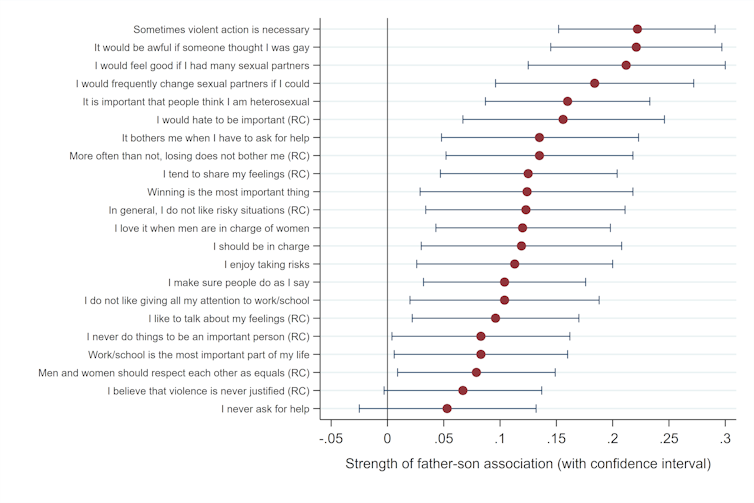Today’s men express their maleness in different ways. Some adhere to more traditional models of masculinity, characterized by beliefs in male superiority and endorsement of risky or violent behaviors. Others embrace more progressive stances.
But how do men develop their ideas, beliefs and behaviours in relation to masculinity?
Our new study addresses this question by focusing on one important factor influencing how young men express their masculinity – their fathers. Our research set out to ask: do young men “copy” their fathers’ masculinity?
We found that young men whose fathers support more traditional forms of masculinity are more likely to do so themselves. This highlights the critical role fathers play in steering boys towards healthier ideas about masculinity.
Measuring masculinity
We analysed data from 839 pairs of 15-to-20-year-old men and their fathers. These data were taken from a large, Australian national survey on men’s health.
The survey asked men a set of 22 scientifically validated questions about how they felt and behaved in relation to many issues around masculinity. For example, they were asked about:
- the significance of work and social status for their sense of identity
- their take on showing emotions and being self-reliant
- their endorsement of risk-taking and violent behaviors
- the importance they assigned to appearing heterosexual and having multiple partners
- and their beliefs about winning, dominance over others and men’s power over women.
Taken together, the answers to these questions offered us a window into whether the men participating in the survey adopted more of a traditional or progressive type of masculinity. They also enabled us to compare fathers’ and sons’ expressions of masculinity.
What we found
We found that, on average, young men are slightly more traditional in how they express their masculinity than their fathers.
On a scale from 0 to 100, with 100 indicating high conformity to traditional masculinity and 0 indicating low conformity, the average masculinity score for young men was 44.1, and for their fathers, it was 41.

Using statistical models, we then examined whether there was an association between how traditional a father’s masculinity is and how traditional their son’s masculinity is. To make sure we isolated the effect of fathers’ masculinity, the models took into account other factors that may also shape young men’s expressions of masculinity. These included their age, education, sexual orientation, religion, household income and place of residence, among others.
The results were clear. Young men who scored highly on the traditional masculinity measures tended to have fathers who also scored highly.

This indicates these aspects of masculinity are comparatively more likely to be “passed on” from fathers to sons.
What our findings mean
As is well-established, social learning is important in shaping young people’s attitudes and behaviours. While fathers aren’t the only influence, our study suggests young men learn a lot about how to be a man from their dads. This is an intuitive finding, but we had little empirical evidence of it until now.
Confirming that dads “pass on” their masculinity beliefs to their sons has far-reaching implications. For example, it goes a long way in explaining why traditional models of masculinity remain entrenched in today’s society. Our study indicates that breaking this cycle requires bringing fathers into the mix.
Policies, interventions and programs aimed at promoting healthy masculinity among young people are more likely to work if they also target their dads. This proposition is consistent with a growing body of programs focused on engaging fathers in positive parenting.
What’s more, our findings underscore the potential long-term effects of successful intervention. If a program manages to help young people develop positive masculinity, it’s likely that — as they themselves become fathers — their own children’s masculinity is also positively affected.![]()
Article written by Francisco Perales, Adjunct Associate Professor, School of Social Science, The University of Queensland; Ella Kuskoff, Research Fellow, ARC Centre of Excellence for Children and Families over the Life Course, The University of Queensland; Michael Flood, Professor of Sociology, Queensland University of Technology, and Tania King, Associate professor, The University of Melbourne
This article is republished from The Conversation under a Creative Commons license. Read the original article.

The idea that having multiple sexual partners is a mark of traditional manhood could only be believed by left-wing academics who already had their conclusions drawn before they did the study, and assumed progressive manhood was morally and intellectually superior.
The descent of fatherless boys into promiscuity, domestic violence, crime, and gang membership is excellent proof that fathers civilize their sons and direct their masculinity into positive and moral paths. The primal brutishness of men was better known by uneducated people of past generations than by today’s PhD’s who think they are geniuses always inventing the wheel for the first time.
A laughable study. It would be satire if it wasn’t all too real.
Well said Sir.
Wow, you are telling me you actually needed an expensive study to discover what is overwhelming obvious.
And who determines what is positive and negative masculinity?
As far as my children are concerned, I do, not you or anyone else. That masculine enough for you?
In other news, water is wet.
I find it disturbing that the article suggests that masculinity needs reform or correction. A better use of funds would be to rescue young men who continue to fall behind women in education, career and marriage prospects. A society that neglects the needs of boys will crumble.
this “research” article is a woke joke. traditional masculinity is exemplified through the Savior of the world …. Jesus Christ. Having multiple sexual partners is not a sign of masculinity. It is a sign of sexual selfishness and immaturity. Sometimes violence is necessary as Jesus demonstrated by overturning the tables in the temple out of anger for the disrespect of God our Father in heaven.
I am suspicious about this study, as it presents this as a “problem” pattern that needs breaking AND it’s link to a paper describing “positive masculinity” is a paper that defines masculinity as being a male who is both feminine (collaborative, communicative, pacifist, etc.) AND more important,a political “ally” with leftist gender equality goals. Politics should not be considered a biological metric in a scientific study.
*its
What a limited silly description of traditional maleness,” characterized by beliefs in male superiority and endorsement of risky or violent behaviors.” How about protecting, providing, and doing the worst tasks so women don’t have to. That’s the traditional masculinity my father taught me.
This study left out many significant masculine traits. Masculinity also includes self sacrificing risk taking to protect women and children. It includes care of the weak. It includes respecting parents and similar authority. It includes personal honor and integrity. A strong man is always gentle. Gentlemen stayed on the sinking Titanic to make lifeboat room for women and children. These traits are critical and missed by fatherless boys.
With the advent of wokeism infecting the academic community pushing its agenda the expense of actual science, articles like this can no longer be believed at all.
They have more in common with an opinion piece on a partisan news channel than actual science.
This is what happens when DEI hires based on equity perform so-called “research”.
They already know the answer they want to get and then they “discover it” and attempt to use the credibility of science to insist on their beliefs’ credibility.
Such articles like this are not credible and should not be believed regardless of what they say.
Why do I get the feeling that these people shouldn’t be trying to shape anyone’s idea of masculinity? That their idea of positive masculinity is making men more feminine and emotional instead of making men the strong leaders that society needs today.
“Some adhere to more traditional models of masculinity, characterized by beliefs in male superiority and endorsement of risky or violent behaviors”
How is it you define that as “traditional”
Traditional masculinity involves protecting your spouse and children, providing for them, and the willingness to put them before yourself. Does that mean it some instances you must you violence? Yes. But being unwillingly to unleash violence on someone that is going to harm your children or wife is not “a more progressive stance on masculinity”. It’s simply weakness.
You gender-confused limp wristed liberals will be the downfall of western culture.
You lost me in the first paragraph with the pejorative generalizations of men. Get a life.
Seems fairly obvious for those raised with and by fathers. Much more interesting would be to take this study to the next level, masculinity of males raised by single (abandoned) mothers.
The results of this study could be the result 100% of genetics. There is NO LEARNING being demonstrated by this correlational study at all.
I love this study. Raise your son to be a real man, or raise your son to be a new man. Wonder which one will be happiest,
What a bunch of drivel. Who thought of these ridiculous questions to check the measure of a man’s masculinity. Not a one of those have anything to do with masculinity. However in keeping with todays norms I am sure the limp wristed designers of this are quite sure they have asked the right questions.
As others have pointed out, this is close to pseudo-science level polling. My take is besides the lack of a control group, how can one use such a skewed sample and then base it off of an entire gender? I mean first we have the OZ regional (continental) bias, then we also have the racial bias (4/5 euro). This belongs in a town-level or regional level survey and nothing more.
The headline/title is misleading – like how they put a photo caption of black ppl at the top yet the survey has nothing at all to do with this group.
Dangerous virtue -signaling may be going on here.
Congratulations! You’ve discovered role models.